When I first started playing Mass Effect, I was very careful to not spoil the plot for myself, other than finding out that seemingly everyone hated the endings. So there I was, playing through Mass Effect 3, and I noticed some strange happenings in the game that didn’t really make sense. But I tucked the information away and continued playing. And then a few more odd things graced the screen. And then I started (gasp) remembering events from previous games. More strange things started happening, until I played through the ending sequence (of the original, and then extended, endings), sat back, and thought to myself:
“Wait… Was Shepard indoctrinated??”
Imagine my delight when I searched the interwebs for any information on the possibility of an indoctrinated Shepard and saw that I wasn’t completely crazy; other people thought this, too, and gave birth to the Indoctrination Theory (IT). While my ideas are a little different than those imposed by the IT (of course they are), there’s quite a bit of information out there on it, and a number of YouTube videos. So I’m going to go through some ideas the IT poses, and then pose my patented “Athena’s Theory of Shepard’s Indoctrination.”
Please note: I’ll be talking about the Mass Effect 3 endings, so beware spoilers. I can’t mark them because they make up the entire article…
What Is Indoctrination?
Indoctrination is the special brand of brainwashing that the Reapers employ in order to “convert” organics to their cause. While the games never fully explain the exact methods employed by the Reapers to achieve this, through reading the codices and conversations with people who have been “liberated” from indoctrination, the experience is similar to that of hearing a whisper that you can’t ignore, compelling you to do things that you do not want to do. It begins usually through the exposure to a piece of a Reaper or other Reaper object, such as Object Rho.
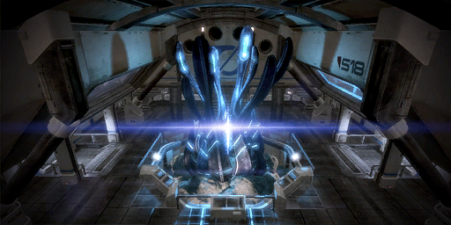
The person being indoctrinated may feel like he or she is being watched, and eventually will begin to believe that the Reapers are sympathetic creatures who deserve all devotion. In extreme cases, the Reapers may “assume direct control” over the body of an indoctrinated individual, making it an undeniable agent of the Reapers.
Still with me? Let’s start testing this process against some game events.
Exposure to Artifacts and Dreams
Shepard has been exposed to Reapers quite a bit throughout the series. She not ony interacts with Sovereign in the first game and Harbinger in the second, but also spends some time within a Reaper corpse. If that isn’t enough, she is also exposed to Object Rho pictured above) in close proximity for three to five minutes (approximately) during the events of the Arrival DLC. This is a canon event, as well, as the events of Arrival occur whether or not a player experiences the DLC or not, as it’s referenced in Mass Effect 3 and her actions during the DLC are the reason she is in custody.
Rewind to speaking with the rachni queen in the original Mass Effect. She speaks of a different sort of song that her people heard, an “oily” song with “silver screams” and whispers. Fast forward to Mass Effect 3, and we have a chance to see Shepard’s nightmare, consisting of hazy dreams with dark, shadowy figures and whispering, which become more emotionally trying as the game progresses.
Speaking of which, another detail often pointed out is that in Shepard’s nightmares, Shepard can only move in slow motion. Likewise, when she is walking to the beam during the final battle, all of her movements are slowed, just like in her dream. Some believers in the IT see this as a purposeful parallel between the dreams (happening in her head) and the experience of slow indoctrination (happening in her head). Let’s take a look.
Notice the oily shadows? And the persistent whispering? And the voices of the people taunting her… Kelly Chambers (who, in this playthrough, died when Cerberus attacked the Citadel), Thane, Legion, and Kaiden. All friends that Shepard couldn’t save.
Oh, and the voice of the Illusive Man. Another poor indoctrinated fellow.
This Shepard’s On Fire
Additionally, these nightmares occur after every set-back in the game, or when Shepard’s stress level has increased – meaning she is more vulnerable to Reaper suggestion. The final nightmare sequence shows Shepard kneeling next to the boy. When the pair turn to face (the dreaming) Shepard, they immediately catch fire.
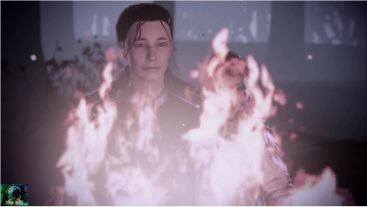
The IT suggests that this is Shepard’s subconscious, symbolically conveying that she, like the little boy back on Earth, is being destroyed by the Reapers. Alternatively, it could be the Reapers trying to drive home the death and destruction that has been haunting Shepard since the beginning of the war.
Boy On Earth and Other Hallucinations
In the beginning sequence of Mass Effect 3, there is a brief clip of a boy running into a building that is destroyed by a Reaper beam immediately afterward. Shepard and Anderson run into that building moments later, and Shepard finds the little boy hiding in a vent. Shepard seems to be the only one who hears the little boy, and when Shepard’s attention is pulled away for a moment, when she turns back to the vent, the boy is gone. More eerily, a Reaper growl is heard in the soundtrack.
This boy returns to the scene later when trasports are readying to take off. The little boy runs to one of the small ships, amidst Alliance officers and other escaping humans. He is completely alone and pulls himself into a shuttle. No one else seems to notice him or try to help this lone child get to safety. The boy makes eye-contact with Shepard before the shuttle departs and is destroyed by a Reaper beam.
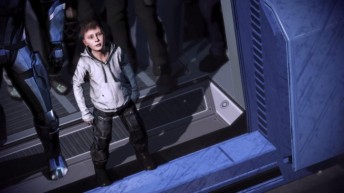
The IT poses that this little boy may have been real when he ran into the destroyed building, but because Shepard seems to be the only one who sees him after that, he turns into a symbol of all the people Shepard couldn’t save (which is what taunts her in her dreams, as well). The Reapers use this imagery to further weaken Shepard’s mental resistance by adding to her emotional stress which, as we’ve discussed, weakens a person’s ability to fight the Reaper influence.
It’s All About Harbinger
Throughout Mass Effect 2, there are moments when the screen becomes rimmed with what looks like blood splatters, forming a circle through which the viewer can watch the action. The angle of the camera implies that the team is being “watched” by someone other than the player. The assumption is that this “watcher” is actually Harbinger, a Reaper with a bit of an obsession with Commander Shepard.
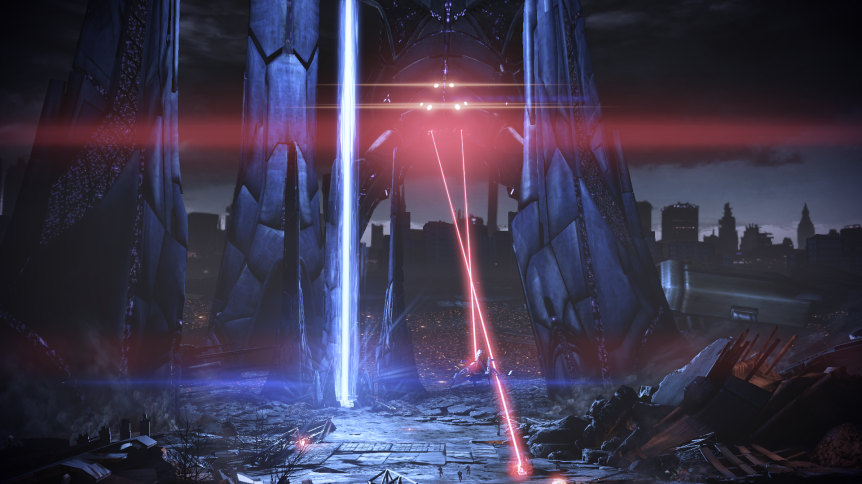
In Mass Effect 3 we see this bloodied-circle effect again, most notably when Shepard opens her eyes and makes the final, painful push toward the beam to be led up to the Crucible. This entire sequence is not only shown through Harbinger’s eye (the red circle), but Shepard also moves in slow motion, like her nightmares, linking the Reaper’s “watchful” eye to the implementation of Shepard’s dreams.
While we’re on the topic of Harbinger, in the Extended Cut Edition, two words of dialogue were added as Harbinger shoots his beam at Shepard. As the beam tears through the ground toward Shepard, stopping before it actually reaches her, Harbinger’s voice growls, “Join us.”
Inconsistencies in the Gameplay
During the final push to the beam, and after Shepard reaches it, a few strange and inconsistent things happen. First of all, after Shepard is knocked away by Harbinger’s beam, when she wakes up we see grass and trees where there were none before. In fact, these are the same kinds of grass and trees in the dream sequences.
Additionally, Anderson reports that he follows you to the beam, but yet he is somehow far ahead of you in the Citadel. “Coming out in a different place” doesn’t make sense, either, as there is only one path to the control panel.

And finally, when the Catalyst introduces Shepard to the choices, the person in the “control” scene looks like a man in a suit (who looks a lot like the Illusive Man), and the person in the “destroy” sequence looks like an Alliance military man with a brimmed cap (who looks a lot like Anderson). Why doesn’t the Catalyst show Shepard completing these actions? Perhaps because, in Shepard’s mind, control is what the indoctrinated Illusive Man wanted, and destroy is what the Alliance part of her wants.
There are a few more interesting details, like Shepard’s injuries, but we’ll look at this a little more in the video below.
Color Reversal
Throughout the entire series, “red” dialogue options have been renegade ones and “blue” options have been paragon ones. Most of the time, people take the word “renegade” and equate it with “bad” (for good reason: BioWare had some real jerk dialogue that Shepard could whip out!), but what the renegade option is, at its core, is the option that gets the job done, no matter what. Paragon is the “play nice and try to convince others of your way of thinking” option.
Standing in front of the Catalyst, we have:
- The red option: destroy
(“We destroy them before they destroy us.” -Anderson) - The blue option: control
(“Control is the means to survival.” – Illusive Man) - The green option: synthesize
(“Is submission not preferable to extinction?” – Saren)
Red and Blue Reversal
Most arguments against the “destroy” option say that the developers are clearly marking it as the “bad” option, since red has stood for renegade during the past three games. But all those people are wrong.

It’s really just a slight misunderstanding. Renegade does not mean “bad.” Renegade means getting the job done no matter the cost. This leads me to two conclusions:
- This is, in fact, the renegade option, because it gets the job done no matter the cost. Shepard has wanted to destroy the Reapers for three games. This does it. Period. Job? Done. Day? Saved.
- Knowing that the players associated “renegade” with “bad,” the developers left the red color in, since this is what the Catalyst shows you. The Catalyst doesn’t like this option. It’s the bad option, according to the Catalyst. So the Catalyst offers this option using the “bad renegade” color to
indoctrinate youget inside your head and manipulate your actions.

The blue option, control, is colored as a paragon choice. Paragon options are usually considered “good,” although in practice they are usually a mediating one, meant to bring another person to see the “reason” of another person’s way of thinking. For instance, during the paragon option to brings peace between the geth and quarians, but Shepard uses her paragon talents to convince the quarians to see things her/the geth’s way. Unlike the renegade option (during which Shepard yells out a reprimand at the quarian fleet), the paragon option convinces the quarians not to do something differently, but to see things differently.
The Green Option
The Indoctrination Theory (from what I’ve seen) tends to dismiss this as “well, this is what Saren did, and it’s therefore bad.” Unfortunately this falls apart against arguments that question why synthesis only becomes available when Shepard attains the highest military readiness score. Following the logic of Shepard being indoctrinated, this option is truly the hardest to attain, after all, destroying and controlling things are easy, but merging two disparate creatures into one takes a lot of skill and more than a little finesse. So it follows that the most difficult option to succeed at would require the most amount of preparation.
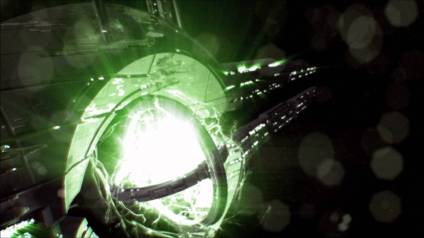
But that doesn’t change the fact that Saren, who was indoctrinated, supported this option as the “final solution” to the Reaper threat.
And it’s green… well I don’t have a reason for that, other than it was another “safe” looking color for the Catalyst to use to confuse Shepard/you into believe it’s a good option.
A Few Counterarguments
There are a couple big questions that the IT left in its wake, including:
- Why would the Reapers design a “destroy” option in the Crucible in the first place?
- How does Shepard know the “results” of her decision (e.g., Normandy flying away, etc.)?
- Why do people still believe in the IT after the extended cut explained everything?
I’m so glad you asked!
My Original Thoughts
Prior to reading about the Indoctrination Theory online, my interpretation entailed a hybrid of the Indoctrination Theory points, but also dealt with a few of the lingering questions it left. This is explained a little more in the video I made below, but for starters:
In the game, Harbinger shoots his beam, Shepard goes flying, and we hear comm chatter that no one made it to the beam. Then, once Shepard opens her eyes, we see Harbinger leave. He doesn’t think Shepard is a threat anymore, although he’s still watching her. Everything leading up to Shepard going up into the beam is happening in reality, although Shepard’s perception is altered by Harbinger’s “eye” – his indoctrination attempts. She loses consciousness before actually making it to the beam. The person who actually makes it to the beam is Anderson.
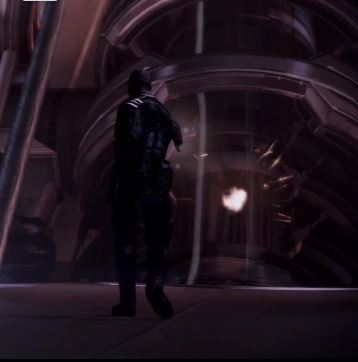
Once inside, Anderson finds and fires the Crucible, as Shepard lies unconscious on the ground, battling for her mind.
But why would the Reapers have a “destroy” option?
They don’t. The Crucible was designed by organics, so it was made to only destroy the Reapers, or perhaps to destroy or control. But the real choice was in Shepard’s mind. I think that by “adding Shepard’s power” (i.e., indoctrinating her), the Catalyst is able to alter how the Crucible fires. This is possible… well this might seem like a terrible reason, but Mass Effect is more science-fantasy than true science-fiction.

Science-fiction tries to explain the science behind the fantastical technologies within in (like Star Trek), and science fantasy just expects you to believe certain things without question (like Star Wars – You’re just expected to believe lightsabers will work because that’s how things are in that universe).With things like Element Zero and biotic powers, VIs becoming AIs, bringing people back from the dead, and being able to mind control people by sticking them in the room with a piece of a robot for a long enough time (all without any real attempts scientific explanation), Mass Effect squarely falls into science-fantasy.
So, following that logic, technically the game doesn’t need to explain how Shepard succumbing to the Reapers could change what the Crucible does. After all, Shepard’s war-readiness is what opens up the synthesis option. Maybe Shepard’s character and strength of will give the Catalyst whatever it needs to be able to fire the Crucible in a way that won’t destroy the Reapers.

How does Shepard know the “results” of her actions? (Normandy flying away, etc.)?
She doesn’t. These scenes are either a hallucination or dream, or – more likely – the game switches between Shepard’s head and actual events, in order to show the player what’s happening. Not everything that happens needs to be from Shepard’s perspective.
But… the extended edition explains everything!
Hackett’s comment that “She did it!” but then says that “someone” made it to the Citadel. Perhaps what “she” did is unite the galaxy and lead a campaign that would beat the Reapers. That doesn’t mean she made it to the Citadel. Considering the man shooting the canister for “destroy” looks like Anderson, an the man holding onto the “control” beams looks like he’s wearing a suit (cough like the Illusive Man), it’s possible that Hackett is right: “someone” made it, but that doesn’t mean Shepard made it.
Shepard wakes up only after the destroy ending.
She only wakes up after the destroy ending because she hasn’t been assimilated into the Reaper consciousness. She has maintained control of her mind. Her fight has been on Earth, and that’s why she wakes up surrounded by concrete rubble, instead of the futuristic material of the Citadel. It also explains why she didn’t burn up on re-entry.
Dear BioWare,
Yes, I am looking for a job and would love to write for you.
Love, Athena
I admit that I have days when I like the Indoctrination Theory (both mine and others’), and days when I think it’s complete nonsense (because who doesn’t sit around and think about the Mass Effect 3 endings every day?). But what really matters is…
What do you think? Does the Indoctrination Theory hold up? Or is it just an attempt by fans to explain inconsistencies using the lore and the Power of Overthinking? Do you subscribe to the Indoctrination Theory? Let me know in the comments!
Thanks for stopping by, and I’ll see you soon!
~Athena
PS Whew! We made it! A whole month of Mass Effect-themed feature posts! With Andromeda here, we might be taking a look forward with the themes that the new installment covers, but I hope you’ve enjoyed looking back at this fantastic trilogy as much as I have!
What’s next? You can like, subscribe, and support if you like what you’ve seen!
– Support us on Patreon, become a revered Aegis of AmbiGaming, and access extra content!
– Say hello on Facebook, Twitter, and even Google+!
– Check out our Let’s Plays if you’re really adventurous!


I do like this theory (especially the “final boss” aspect of it) and I feel it holds water. I’d probably want to play through the games again to come to a proper conclusion though.
LikeLiked by 1 person
Definitely. This is one of those endings where you want to see the beginning again to determine if all the details really add up. I’m glad I’m not the only one who thinks this is a plausible outcome, though! 🙂 Let me know if you play through the trilogy again haha
LikeLiked by 1 person
I believed the indoctrination theory until they released the free update that extended/explained the ending. I downloaded the update but never re-played it. Several of my friends said it dispelled the indoctrination theory, which is a shame because I thought it fit perfectly 🙂
LikeLiked by 1 person
Yeah many people fall into that camp. I still think a compelling argument could be made that the indoctrination theory is still supported by the extended endings, but the beauty of it is that the endings are still open to interpretation! Thanks for commenting! 🙂
LikeLiked by 1 person
Oh that’s cool 🙂 I don’t know myself as I never played the extended ending 😛 By far the most compelling bit of evidence is Shephard waking up in the crater after going renegade. That’s why I thought it all fit well 🙂
LikeLiked by 1 person
Absolutely, that’s a piece of it 😉 If you get a chance to play the ending again, come back and let me know your thoughts/if you think my argument here holds up! 🙂
LikeLiked by 1 person
Zero chance I’m afraid! I sold my Xbox a few years ago and all my saves are gone. Still a remarkable trilogy though! I remember it fondly even today 🙂
LikeLiked by 1 person
After playing MEA to the point I’m at (I’m near the end now) it makes me feel differently about how I even see the outcomes of ME Trilogy. I’d like to discuss further but that would be spoilers for the new game. I’m not just speaking only of the SAM integration but of things you learn after about the technology of this new system.
Obviously Andromeda has yet to yield any relays being it’s not the Milky Way, but the Reaper tech being tied to the relays and how that could implement ties into our new story. The relays being destroyed in one option brings certain thoughts as does the late departure of Quarian ark that was also supposed to bring other Milky Way species, and possible Geth outcomes from ME3.
How would the different options at the end of Shepard’s story really change the potential future?
One would seem to leave the Milky Way in a primitive state, one he basically becomes consciousness for the Reapers and leaves them all in peace, and lastly the integration of AI and Biological beings.
I feel like a Salarian thinking about it all now vs how I felt about it when I finished ME 3 last.
I was okay thinking Shepard dies at the end regardless of choice, or at least in a physical state of an individual.
I never really thought it was indoctrination anyway I looked at it, I’d just like to know which outcome became canon, and the possibility of a relay being in Andromeda or even being built in Andromeda with let’s say new technology at our disposal.
LikeLiked by 1 person
Sounds like I’ll have to revisit this when I’m further in Andromeda, then! I appreciate the points you bring up 🙂
And I don’t think BioWare made any of the events canon, so every player could have their own “canon” ending. Since the Andromeda Initiative left around the time of Mass Effect 2, I suppose the endings might not “really” matter…?
LikeLiked by 1 person
Even if I were able to pick the state of the Milky Way off past play throughs, I wouldn’t know which one to pick with knowing what I do about Andromeda. Which isn’t a lot, even towards the end.
LikeLiked by 1 person
I have never a supporter of the indoctrination theory and do not accept it. I want the events seen in the end to reflect reality. In fact, indoctrination theory contradicts my own theory on what happened. My theory us that Shepard is resistant to indoctrination. There have been moments which Shepard is not indoctrinated. On Thessia, the Protheans hologram confirms that she is not tainted by indoctrination.
In my theory, Shepard is able to activate the Crucible precisely because she is NOT indoctrinated. And I believe she is not indoctrinated because she herself is also effectively synthetic. The idea is that the Crucible will only work if a non-indoctrinated organic activates it. Shepard is the first to meet this criteria. It us never confirmed in the game, but I think it makes sense.
In the end, I don’t accept IT because I don’t like it. However, if IT makes others enjoy the game, then they should adopt it. Why not.
LikeLiked by 1 person
Interesting thoughts! Just to play devil’s advocate, I assumed that the VI on Thessia meant that Shepard wasn’t indoctrinated in that moment (which she wasn’t). At the least she wasn’t at all, and at the most she was still fighting it. I’m interested in the idea that only a non-indoctrinated person can activate the Crucible. Is this is one of the codices somewhere? I also thought that her synthetics would just be additional fuel for the Reapers to convince her that their way was the “best” way – wearing her down more.
That’s fine if you have your own theory as to the ending! One of the great things about Mass Effect’s endings is that they *do* leave a lot open to interpretation, which is great!
LikeLiked by 1 person
My idea is not supported anywhere. It just makes sense to me. And it seems logical. But you won’t find it in any codex.
The Thessia encounter seems to support my theory that Shep is resistant or even immune. As you say in your article, Shepard has direct contact with Reapers and their artefacts several times. Most of these happen before the Thessia meeting. So if there was any taint of indoctrination, why did the Thessia hologram not detect it?
My suggestion that Shepard is immune because she is synthetically created is just a theory. The idea is that the Lazarus process wiped away any previous indoctrination and somehow made her immune to it.
The question I ask is: “Why should it be Shepard rather than someone else that can activate the Crucible?” The answer is that Shepard is unique. She is a synthetically created organic being which is immune to indoctrination. This was a crucial element to activating the Crucible.
My theory is not canon. But I feel it ties up some loose ends. It could explain for example why there was no resistance on the Citadel after Shepard entered it. Perhaps the the Citadel detected it and let her through. But if course, I recognise this is all conjecture. It is not supported by any codex or canon.
You are right about the openness of the ending. The truth is that everyone has to head canon their own scenario to some extent regardless of what ending is chosen. In that sense, I feel no one is wrong.
However, that does not make the ending necessarily ideal. And that is shown by the fact that the next instalment of ME had to effectively discount 50% of the trilogy.
LikeLiked by 1 person
Another thing I wanted to mention was your brief discussion on the Paragon/Renegade question. It us wrong to assume that it relates to good/bad or the
at they are even opposites.
To me a renegade is risk adverse and expedient. Shep does not want to waste time with trivialities. Plus she doesn’t take risks, resulting in ruthless actions like killing the Feros colonies and Shiala in ME1.
Paragon is more compromising and compassionate. In such cases, Shep prefers to compromise with potential foes and give them a chance rather than kill them. This is of course leads to accepting a degree of risk.
I think the association of Destroy with Renegade and Control with Paragon is consistent with these definitions. In Destroy, Shepard refuses to take any risks in letting the Reapers live. She is wiling to sacrifice her allies to to ensure the Reapers are destroyed. She takes the most expedient rout regardless of the cost.
In Control, Shepard believes there may be a possibility to compromise with the Reapers. In this case her compassion for synthetics overrides the risk that controlling the Reapers may go wrong.
Synthesis is the ultimate gamble. Shep bets that the Universe will be a better place by making the Reapers part of society.
LikeLiked by 1 person
Wow! I’m impressed with your attention to detail 🙂 I certainly didn’t mean to convey that I personally think that paragon/renegade means “good” or “bad,” or that they should or shouldn’t be viewed as such. I think there are many players who do, however, and an argument can be made that “renegade” often relates to “jerk.” Punching a reporter in the face is sort of a jerk move, or roughing up a prisoner is just a tiny bit illegal in our day and age. So my personal opinion is that the devs took that *reputation* of paragon/renegade and utilized it in the game.
As I stated, renegade was intended by the devs to mean “get the job done,” whereas paragon was more compromising, as you also alluded to. So, yes, destroy goes along with renegade (but isn’t “bad”) and control is more paragon (which isn’t necessarily “bad,” either).
LikeLiked by 1 person
Sorry. I gave the wrong impression in my post. You made clear that you did not believe that Paragon/Renegade means good/bad. I was effectively agreeing with you. I was effectively expanding on your idea that Renegade means getting the job done. I am suggesting that this is broadly correct, adding that Shep does it as expediently and risk free as possible.
LikeLiked by 1 person
I loved the first few paragraphs of your, mostly likely, awesome article! I’ve bookmarked it for future me to read this, when she finally gets around to playing those glorious Mass Effect games. 🙂
LikeLiked by 1 person
Ahhhh! Haha okay. I look forward to hearing from future-you 🙂 And thanks. I’m glad you liked the opening!
LikeLiked by 1 person
very cool theory, the more I read your discussions and theories about ME3 endings the less i hated them 😀
I’m convinced that there is at least an attempt indoctrinate Sheppard. Whether it was successful or not based on the ending i’m unsure, but definitely the Reapers tried
this makes me want to replay those games, it’s cool to see the game after knowing the ending and notice things that you may not have before especially knowing the discussions around this theory
LikeLiked by 1 person
If you hate the endings less, then I’ve done my job haha 😀
I agree. I think the Reapers definitely wanted Shepard on their side/out of the equation, but you’re right that it’s impossible to really know if it was successful or not. I also agree that it’s fun to go back and see the beginning again, once you know the end, so you can fit all the pieces together (I can’t remember if I said that to you or someone else, so I;m sorry if I repeated myself!)
LikeLiked by 1 person
Yup in the Reapers eyes Sheppard was probably the biggest threat
LikeLiked by 1 person
I need to watch the video, but for IT, the first time I watched my husband play the game and I found out about indoctrination I immediately thought, “What’s stopping Shepherd from being indoctrinated?” She’s been exposed to Reaper artifacts numerous times, and that’s what they do. I’ll have more to think about/say when I get to the ending, but there’s no way BioWare didn’t want this to be a consideration.
Also, I’m going to probably use this article as a reference, because Reaper indoctrination is eerily close to something similar in FFVII, and this is inspiring me to plan a comparative (when I have that elusive creature time in my hands).
Brilliant article as usual!
LikeLiked by 2 people
Thank you! I’m sure BioWare knew what they were doing, as they didn’t completely annihilate any trace of it with the extended endings! Definitely let me know your thoughts when you see the ending!
And you can absolutely use this article as a reference! I’m flattered. I’d also absolutely read a comparative FFVII article that references indoctrination/indoctrination-type happenings!
LikeLiked by 2 people
I saved the link so when I get to it, I’ll definitely use it! You’ve pretty much brought up all the points I want to use to compare/contrast. It’s just a matter of me outlining, organizing, and making the time 🙂
LikeLiked by 1 person
I’ve played through the series 1 and 2/3rds times, but I don’t think I’m really familiar enough with the small details to be able to comment on the indoctrination theory in any sort of depth. I don’t think it’s intended by the authors, but that doesn’t necessarily mean that you can’t pull it out of there. The whole Death of the Author deal is a beautiful thing.
That said, I don’t entirely think the indoctrination theory holds water. And, if I were to buy it, I don’t think it would make the story any stronger, either, without a whole lot more in-story pushing towards it. I can buy that Shepard was less and less in her right mind as the theory goes on, but personally, I don’t find the evidence towards indoctrination compelling enough to overcome the conflicts with that theory. In particular, if she was indoctrinated, towards what end? With the events going as they were, what would the Reapers be getting out of it. The only ending that would give them anything is the Synthesis ending, which, as you mentioned, requires the galaxy to be putting up the most resistance in order to obtain. The Control ending would give them a hivemind if Shepard’s indoctrinated, somewhat like the Geth, but there’s easier ways to get that given that they are all synthetics. But outside of Synthesis, there’s no endgame for the Reapers, and given that they seem to be more apt to prevent that from happening in the first place, that theory’s a bit problematic.
Unless you’re of the opinion that Shepard’s hallucinating the ending, which would invalidate all of it, and… well, grumpy as I am about it, I really don’t think that having no ending would be better than the ending we got.
LikeLiked by 1 person
Yeah I like that there is so much room for interpretations.
And the IT definitely still has holes. Like I said, I’m not a 100% believer either, but it makes nightmares and ending very interesting to think about. Of course, Shepard slowly succumbing to the stress put on her (which is what I thought when I first started seeing the nightmares in ME3) is also an interesting direction to explore, as well. If I had to support the IT after reading your comment, I’d say that the indoctrination would be more of a personal victory for Harbinger, who has had a keen interest in Shepard since ME2, rather than any galaxy-altering event.
I don’t think Shepard hallucinates the conclusion at all! Yikes how awful would that be? The Reaper threat is ended, even if Shepard is indoctrinated. I think solid cases can be made on both sides of the issue, and BioWare hasn’t exactly said (as far as I know) whether the IT is “real” or not, although I personally don’t think they *intended* for it to be an interpretation, they didn’t exactly clean up the loose ends (that they knew about before the extended cut was made), either. So it’s all up for interpretation! Honestly, I meant what I said: sometimes, I think this theory explains so much, and other times I think this is just a different way of looking at the endings but not something that really explains everything/anything.
LikeLiked by 2 people
The IT-theory is basically toast for me now 🙂 Excellent reasoning
LikeLiked by 1 person
It’s toast?? haha Oh no how did I un-convince you??
LikeLiked by 1 person
Pretty much this one:
Why would the Reapers design a “destroy” option in the Crucible in the first place?
I don’t know why I didn’t think of it myself. It’s pretty obvious (now, that is)
LikeLiked by 1 person
True, true. That is a big detail to explain!
LikeLiked by 1 person
Unless the reapers had an existential moment where they designed it so that their self-destruction would be justifiable if someone “beat their test” blabla
LikeLiked by 1 person
Nah, I think for the IT to work the humans had to have designed the “destroy” option, and then the other two are based on Reaper interference. Although a Reaper existential crisis would be an interesting through experiment…
LikeLiked by 1 person
Yeah, if they “felt” they had peaked, and ended up in a nihilistic state 😀
LikeLiked by 1 person
Bit of a nitpick, but I wanted to point out that Shepard didn’t canonically encounter ‘Object Rho’. The events of ‘Arrival’ take place regardless but, if you didn’t play/purchase that DLC, then Shepard is in custody for unspecified reasons (dumb – the whole game is dumb) and the Alpha Relay was destroyed by a company from the 103rd Marine division and you start the game with 50 fewer EMS points (yes, rather than rewarding players who bought their crappy DLC full of reused animations and terrible plot points, they punished those who didn’t).
Otherwise, this is an enjoyable blog and I’m going through a bunch of your stuff now.
LikeLiked by 1 person
Ah, I see. I’m relatively late to the Mass Effect party, so I didn’t play ME3 without playing Arrival and didn’t know that. But wasn’t Shepard in a Reaper in ME2 to get the IFF? I mean, it wasn’t fully functional, but still… I’m just defending my point, of course. I think there are plenty of great arguments against the Indoctrination Theory, as well, and I’ll play that side of the argument sometimes, too! That’s very disappointing that they don’t arrest Shepard for the DLC events even if you don’t play Arrival. Considering Arrival was meant to bridge the gap between ME2 and ME3 (and introduce the new gameplay), that seems like a bit of a fumble on their part.
And nitpicks are welcome, so don’t worry about that 🙂
That’s interesting what you say about the EMS points. I might be misunderstanding you, but wouldn’t having 50 points more after Arrival be a reward for playing, and not a punishment for not?
I’m glad you’re enjoying the articles! Hopefully you’ll stick around and I’ll see you back soon! 😀
LikeLike
Yes, Shepard is exposed to the dead reaper but the trouble with that is that its effects weren’t a standard form of indoctrination (they were stranger because the reaper itself was very badly damaged). The IT is still plausible though, just based on the bizarre presentation of ME3’s final sequence.
I think the developers botched most of ME3’s opening sequence, to be honest. Imagine my first time playing “Okay Anderson and Hackett are talking about Reapers like they barely know anything about them. Oh, there’s a kid – who is he? Is he important? Oh, hey Shepard! Wait, James? Whose James? Why does the game assume I know him?”
As for the EMS. The 103rd Marine Division receives an ‘update’ which deducts fifty points if you haven’t played Arrival. I always interpreted that as the game punishing you for not getting it but I guess that’s debatable.
This is a really nifty blog. I think I’ll check out the theology section in the morning (I’m studying theology at master’s level, myself). 🙂
LikeLiked by 1 person
I see your point about the 103rd division. If it takes away from the baseline EMS then that’s not fair.
And there were definitely some really confusing moments in ME3, which is frustrating because overall I thought the story was a good send-off for Shepard. I wish they had done more with the Heastrom storyline, too. I think it would have added an interesting layer to the reason the Reapers were coming, but time was not on the dev’s side, I think.
And thank you! I’m looking forward to your thoughts. Most of my theological knowledge is from self-study and my almost-minor, so I’d be interested to hear what you have to say!
LikeLike